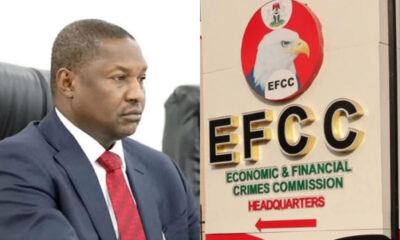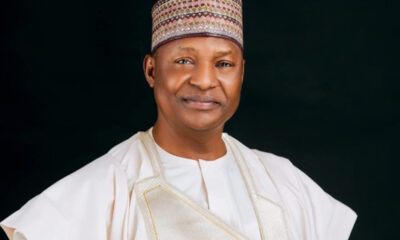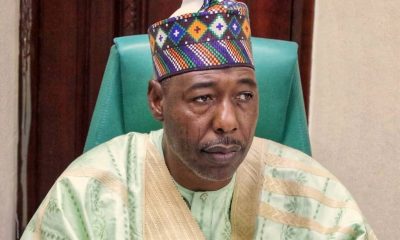News
CJN tackles Malami for indicting judiciary on transparency

Chief Justice of Nigeria (CJN) Justice Ibrahim Muhammad yesterday tackled the Attorney-General of the Federation (AGF) and Justice Minister Abubakar Malami over his scathing remarks about the judiciary.
The CJN rejected the AGF’s claim that the Judiciary is not transparent and that it has been responsible for the delay in justice administration.
Speaking last week in Abuja at the 2020 Justice Sector Summit organised by the Nigeria Bar Association (NBA) Malami joined others in demanding that the Judiciary should be more open in its financial dealings and ensure prompt adjudication of cases.
But Justice Muhammad described the AGF’s unprovoked attack on the Judiciary as unwarranted.
The CJN’s response was contained in a statement by his media aide Ahuraka Yusuf Isah.
The statement reads: “The position of the Minister of Justice and the Attorney-General of the Federation, Abubakar Malami (SAN) that the judiciary be held responsible for delays in the trial and delivery of judgements on corruption cases involving politically exposed individuals appears to be one-sided.
“The Nigerian judiciary is not here to lay claim to be perfect but when the political and economic conditions under which it is operating is compared with its counterparts in other climes, it would be adjudged a prized model.
“The judiciary by its constitutional position does not have criminal investigation unit or ‘Fraud Detective Squad’ to detect and investigate criminal involvement of any person, neither does it have a garrison command to fight its cause or enforce its orders and decisions.
READ ALSO:
- Four Teenage Girls Caught with Human Heads in Lagos
- MURIC to Osinbajo: Why you can’t be president in 2023
- JUST IN: Bandits kill 13, abduct Katsina village head
“More often than not, the Federal Government’s prosecution sector files more charges than it can prove or provide witnesses to prove, ostensibly at times for the prosecution to even fail.
“The Administration of Criminal Justice Act (2015) under reference is infected with sores in some parts, making speeding adjudications improbable in some instances, in addition to high volume of cases, limited number of judges, poor infrastructure or archaic equipment.
“While giving reasons for its under-funding of the judiciary, the Federal Government said on January 26, 2022, at the Nigerian Bar Association (NBA) Justice Sector Summit 2022 in Abuja) that judiciary has not been transparent in the spending of budgets allocated to it each fiscal year.
“Although judiciary has refrained from joining issues all this while but to state the facts, in line with the budget call circular and ceiling the Federal Government sent to the judiciary before the commencement of the fiscal year, the judiciary prepares its budget estimates for capital, overhead cost and personnel cost according to the ceiling, needs and priority.
“The judiciary defends its budget before the senate and the House of Representatives Committees on Judiciary at the National Assembly, besides the initial vetting by the executive.
“The Judiciary has an internal mechanism for budget control and implementation. Each Court and judicial body has a budget unit, the account department, internal audit, Due Process Unit, as well as Departmental Tenders Board.
“There is also a Due Process Committee at the NJC and the Judicial Tenders Board that award contracts on expenditure above the approval limit of the accounting officers of the courts and judicial bodies.
“These layers of control were established by the Judiciary to ensure transparency, accountability and effective budget implementation – the type of transparency that the Federal Government has stressed.
“Similarly, by virtue of Sections 88 and 89 of the 1999 Constitution, the National Assembly carries out oversight visits to the Judiciary to monitor the implementation of its budget. Section 88(2)(b) also mandates the National Assembly to expose corruption, inefficiency or waste in the execution or administration of laws within its legislative competence and in the disbursement or administration of funds appropriated by it.
“The executive also put in place some mechanism to monitor budget implementation and accountability in the Judiciary through its organs like the office of Accountant-General of the Federation and Auditor General of the Federation and other agencies where the need arises.
“Apart from the internal audit units of the Judiciary, the Federal Audit Department maintains offices in all the courts and judicial bodies that monitor spending in the Judiciary. If the Federal Audit raises a query on any transaction and it is not well defended, it sends such to the Public Account Committees of the National Assembly. Officials of the Judiciary would be invited to explain themselves.
“The question to ask is who else should the Judiciary open its account books to, and who among these organs had raised exceptions which were not defended by the Third Arm? The answer is none.
“One only hopes that these allegations against the judiciary by the Federal Government is not just a way of giving a dog a bad name so as to then hang it.”
The Nation
News
NSCIA Secretary-General Clarifies Council Receives No Government Funding

NSCIA Secretary-General Clarifies Council Receives No Government Funding
The Secretary-General of the Nigerian Supreme Council for Islamic Affairs (NSCIA), Prof. Is-haq Oloyede, has clarified that the council has never received financial support from any government, either within or outside Nigeria. Speaking in Lagos at the 31st Annual Pre-Ramadan Lecture of the University of Lagos Muslim Alumni (UMA), Oloyede stressed that the NSCIA operates independently and relies largely on modest private donations to sustain its activities.
Oloyede, who also serves as Registrar of the Joint Admissions and Matriculation Board (JAMB), explained that in his 15-year tenure as NSCIA Secretary-General, the council had not received “a kobo” from any government. He added that fewer than 20 individuals have donated amounts up to ₦500,000 since 2013, highlighting that the council functions without significant external funding. He decried misinformation and divisive narratives suggesting government involvement under the leadership of the Sultan of Sokoto, Muhammad Saad Abubakar, noting that such speculation undermines unity within Nigeria’s Muslim community.
READ ALSO:
- Saudi Supreme Court Calls on Muslims to Sight Ramadan Crescent Moon on Tuesday Evening
- Nigeria Tax Act 2025: FG Clarifies No New Construction or Bank Taxes
- Israeli Airstrikes Kill 12 in Gaza as Violence Persists Despite Ceasefire
Speaking on the theme “Muslims: The Challenge of National Security,” Oloyede warned against viewing insecurity, terrorism, and banditry through a religious lens. He said extremists often cloak their violent acts in religious language, but such actions do not reflect Islam. “Islam cannot be determined by what extremists say or do. We have a duty to correct that narrative,” he said, urging Muslims to reject all forms of extremism while understanding that insurgency thrives on enabling political, social, and economic conditions.
Oloyede stressed that security is central to Sharia, emphasizing that a true Muslim is someone “from whose actions neighbours — regardless of their faith — are safe and secure.” He cautioned against reducing insecurity to regional or religious differences, noting that all parts of Nigeria face security challenges. He called on Muslims to embrace moral responsibility, civic accountability, and practical partnerships to improve national security.
Other speakers at the lecture also highlighted the societal dimensions of insecurity. Dr. Ridwan Jamiu, Chief Imam of Lekki Central Mosque, described insurgents as agents of evil and stressed the need for religious leaders to promote peace and guide followers toward positive community engagement. Lagos State Assembly Speaker Mudashiru Obasa identified poverty and economic inequality as key drivers of insecurity and urged the government and policymakers to focus on job creation, education, and inclusive development as long-term solutions.
The lecture, part of the annual pre-Ramadan engagements, comes at a time when Nigeria continues to grapple with complex security challenges, including insurgency in the Northeast, banditry in the Northwest and North-Central, and rising violent crime in the South. Experts emphasize that national cohesion, interfaith cooperation, and community-led security initiatives are vital to tackling these threats effectively.
NSCIA Secretary-General Clarifies Council Receives No Government Funding
News
Saudi Supreme Court Calls on Muslims to Sight Ramadan Crescent Moon on Tuesday Evening

Saudi Supreme Court Calls on Muslims to Sight Ramadan Crescent Moon on Tuesday Evening
The Supreme Court of Saudi Arabia has urged Muslims across the Kingdom to look for the Ramadan crescent moon on the evening of Tuesday, February 17, 2026, to determine the official start of Ramadan 1447 AH. The court emphasized that community participation in moon sighting is vital for confirming the beginning of the holy month.
In an official statement relayed by the Saudi Press Agency, the Supreme Court instructed anyone who spots the new moon crescent — either with the naked eye or using binoculars — to report their observation to the nearest court and ensure their testimony is recorded. Local centres have also been set up to assist observers in reaching judicial offices.
The Kingdom has established moon sighting committees across regions to coordinate observations and support public involvement. Authorities encouraged citizens to actively participate, noting that their contributions are essential to help Muslims across Saudi Arabia begin Ramadan in unity.
READ ALSO:
- Nigeria Tax Act 2025: FG Clarifies No New Construction or Bank Taxes
- Israeli Airstrikes Kill 12 in Gaza as Violence Persists Despite Ceasefire
- FBI Probe Continues as Ex‑Church Minister Who Confessed to Child Abuse Remains Free
Tuesday corresponds to 29 Sha’ban 1447 AH in the Islamic lunar calendar. If the crescent moon is sighted, Ramadan 1447 AH will commence on Wednesday, February 18, 2026. If the moon is not visible, Sha’ban will be completed as 30 days, and Ramadan will begin on Thursday, February 19, 2026. This aligns with centuries-old Islamic tradition of lunar observation.
Muslims worldwide, including in the Gulf Cooperation Council (GCC) countries, are preparing for Ramadan, a sacred month of fasting, prayer, reflection, and charity. Astronomical forecasts suggest visibility may vary across regions, making local observations and testimonies crucial. Similar calls for crescent moon sightings have also been issued by authorities in countries such as Qatar and the United Arab Emirates.
The Supreme Court’s announcement underscores the importance of lunar observation in Islamic practice and encourages public engagement to ensure a synchronized start of Ramadan across the Kingdom.
Saudi Supreme Court Calls on Muslims to Sight Ramadan Crescent Moon on Tuesday Evening
News
Presidency Dismisses El-Rufai’s Thallium Claim as Diversion From N432bn Probe
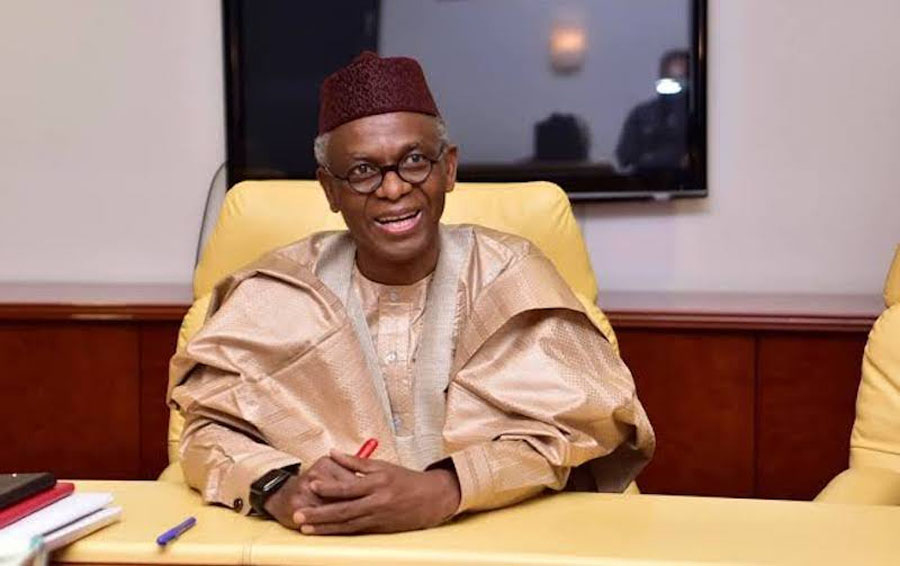
Presidency Dismisses El-Rufai’s Thallium Claim as Diversion From N432bn Probe
The Presidency has dismissed former Kaduna State Governor Nasir El-Rufai’s recent claim that the Office of the National Security Adviser (ONSA) procured thallium sulphate, describing it as a politically motivated attempt to stir tension and divert attention from corruption allegations linked to his tenure in Kaduna State.
Officials said the allegation comes shortly after the Kaduna State House of Assembly reportedly endorsed a petition to the Independent Corrupt Practices and Other Related Offences Commission (ICPC) and the Economic and Financial Crimes Commission (EFCC), urging investigations into alleged financial improprieties totaling N432 billion during El-Rufai’s administration. The anti-graft agencies have since invited him for questioning.
Reacting to El-Rufai’s inquiry to the NSA, the Senior Special Assistant to the President on Media and Publicity, Temitope Ajayi, said the former governor was spreading misinformation capable of generating fear and unrest, while attempting to portray himself as a victim. Ajayi stressed that no government procurement or importation of thallium sulphate had taken place through ONSA.
READ ALSO:
- Ghana Moves to Extradite Russian Man Over Secret Sex Video Scandal
- Residents Flee as Gunmen Launch Fresh Attack on Kwara Community
- DSS Probes El-Rufai’s Claim of Toxic Chemical Import by Ribadu
“Mallam El-Rufai certainly got a reply to his letter from the NSA’s office, and he should be honourable enough to release it just as he mischievously released his own letter,” Ajayi said in a statement shared on social media.
According to the Presidency, El-Rufai’s actions are designed to create political instability and shift public focus away from the corruption allegations he faces. The statement argued that he is attempting to “nationalise his personal challenges” with the Kaduna State Government, insisting the controversy is not about President Bola Tinubu or the NSA, but about his waning political influence after eight years in office.
The Presidency further claimed El-Rufai had lost support from key stakeholders in Kaduna, including political allies, and had fallen out with his successor, Uba Sani, whom he had previously endorsed. Government officials urged the former governor to abandon political theatrics and address the allegations through appropriate legal and institutional channels.
The controversy comes amid heightened attention to both the thallium sulphate claim and the ongoing N432 billion Kaduna corruption probe, with analysts observing potential political and legal implications for the former governor.
Presidency Dismisses El-Rufai’s Thallium Claim as Diversion From N432bn Probe
-

 Education23 hours ago
Education23 hours agoCheck Your Name: UNILORIN Releases Updated NELFUND Refund List for 2024/2025 Students
-

 News14 hours ago
News14 hours agoOsogbo Sons and Daughters Mark 5th Anniversary with Awards, Political Undertones
-

 metro2 days ago
metro2 days agoWoman Arrested Over Murder of Nigerian E-Hailing Driver in South Africa
-

 metro2 days ago
metro2 days agoBoko Haram Terrorists Release Video of 176 Abducted Kwara Residents
-

 News1 day ago
News1 day agoAfenifere Calls for Immediate Take-Off of State Police as Terror Threats Rise in Yorubaland
-
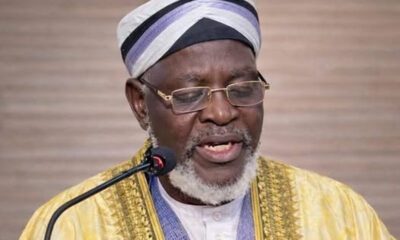
 metro3 days ago
metro3 days agoCourt Orders DIA to Produce Cleric Accused of Coup Plot by February 18
-

 metro1 day ago
metro1 day agoUS Military Boosts Support for Nigeria’s Fight Against Insurgency With Ammunition, Troop
-

 metro1 day ago
metro1 day agoArgungu Festival 2026 Highlights Peace, Stability, Economic Growth — Tinubu



